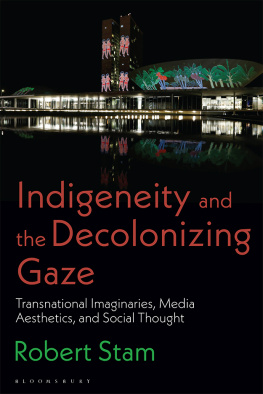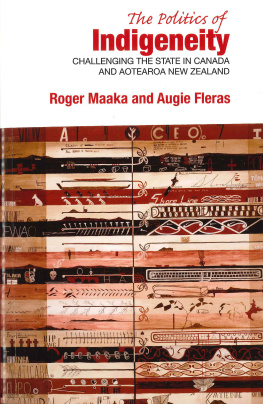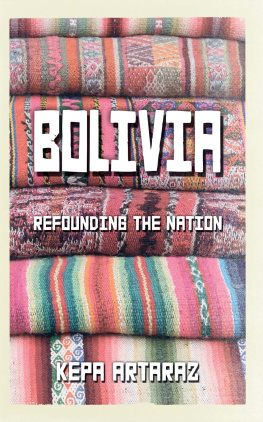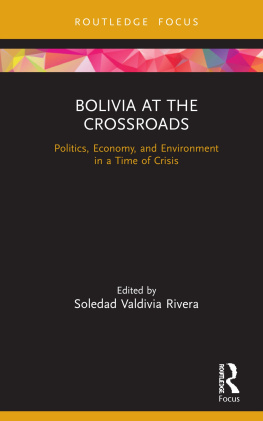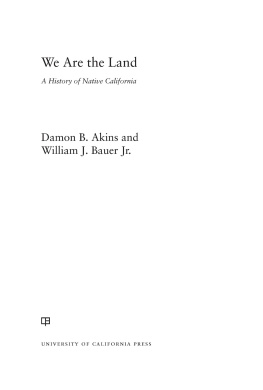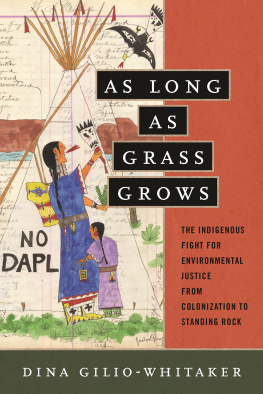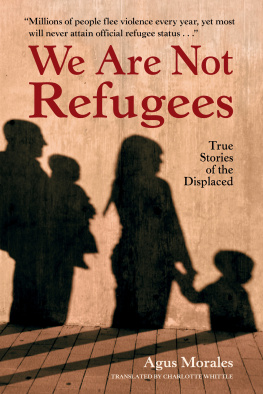Publication of this book was made possible, in part, by a grant from the Andrew W. Mellon Foundation.
2012 THE UNIVERSITY OF NORTH CAROLINA PRESS
All rights reserved. Designed by Sally Fry and set in Arnhem, The Sans, and Chinese Rocks by Integrated Book Technology. Manufactured in the United States of America. The paper in this book meets the guidelines for permanence and durability of the Committee on Production Guidelines for Book Longevity of the Council on Library Resources.
The University of North Carolina Press has been a member of the Green Press Initiative since 2003.
Library of Congress Cataloging-in-Publication Data
Fabricant, Nicole.
Mobilizing Bolivias displaced : indigenous politics and the struggle over land /
Nicole Fabricant.
p. cm. (First peoples : new directions in indigenous studies)
Includes bibliographical references and index.
ISBN 978-0-8078-3713-9 (cloth : alk. paper)
ISBN 978-0-8078-7249-9 (pbk. : alk. paper)
1. Movimiento Sin Tierra (Bolivia) 2. Land reformBoliviaHistory21st century. 3. PeasantsPolitical activityBoliviaHistory21st century. 4. Indians of South AmericaLand tenureBoliviaHistory21st century. 5. Indians of South AmericaBoliviaPolitics and government. I. Title.
HD1333.B5F33 2012
333.3184dc23
2012016634
cloth 16 15 14 13 12 5 4 3 2 1
paper 16 15 14 13 12 5 4 3 2 1
Maps and Figures
MAPS
1 The City of Santa Cruz, illustrating concentric ring roads and key communities
2 Bolivia, showing its nine departments and significant resources
3 The Department of Santa Cruz and its rural provinces, showing key locations
FIGURES
1 Anti-indigenous graffiti, Passports for Collas
2 MSTTierra Prometida community meeting to discuss agroecology
3 MST swearing-in ceremony in Tierra Firme
4 Collective production of hot chile peppers in Gran Chaco
5 MST marching in columnas during the Fifth National March for Land and Territory
6 Protestors arriving in the Plaza 14 de Septiembre
7 Graffiti, Marches and Roadblocks Are Forms of Nonviolent Struggle
8 Tupac Katari poster hanging behind President Morales
9 AntiEvo Morales T-shirt
10 Camba youth holding flags of Santa Cruz
Acknowledgments
I would not have been able to complete this book without the warm and loving support of so many different people. In reality, like so many projects, this has been a collaborative effort. Thanking each and every person who contributed to the final product is the most humbling part of this long journey.
I am extremely thankful and indebted to the Landless Peasant Movement (MST-Bolivia) for letting me into their homes, communities, and intimate spaces of politics. I have learned so much from every organizer. First and foremost, my research assistant, Ademar Valda Vargas, provided stimulating conversations on many a trip to the campo and challenged me to think beyond one-dimensional academic models of production. In many ways, Ademar was my primary mentor and teacher in the field. I express my deepest gratitude to Silvestre Saisari, who trusted me and allowed me into the intimate circles of movement politics. Thanks are due to Ponciano Sulca (mi compadre) and his wife Gregoria Mamani for opening their lives to me in San Pedro and always pushing me to rethink the North/South divide. You have taught me so much! Eulogio Corts, mi cambinga de oro, was my main comrade and friend. Thank you, Eulogio, for your contagious energy, political passions, and transnational friendship. I would also like to thank all the CEJIS lawyers, representatives who sat through hours of interviews and then provided critical documents and a safe place to study and read. It is often your lives that are put on the line for the movement, and I appreciate that kind of commitment.
My mentor Mary Weismantel has provided consistent support and guidance. She has challenged, inspired, and forced me to find my creative voice, and she always knew just what I needed during distinct moments in my career. Micaela di Leonardo, another wonderful mentor, has given me the gifts of theoretical rigor and intellectual stimulation and introduced me to all sorts of ideas that will forever define my scholarship and teaching. Josef Barton opened his office doors to me many years ago when I was in the depth of my despair and patiently guided and nurtured me back to life. I will be forever indebted to him for opening those doors and introducing me to his endless bibliographic resources. I would also like to thank Robert Albro, Jorge Coronado, and Brodie Fischer for their insights and rigorous comments, which helped turn this research into a book. I am especially grateful for Emily Steinmetz and Kathryn Hicks, two of my closest compaeras, who tested, pushed, and radicalized me in recent years. We engaged in a struggle to change the academy, to remain politically committed, and to always be on the frontlines. Thanks also to Raquel Balczar Soto, David Caballero, Umud Dalgic, Jose Muoz, Juan Olmeda, Dawn Pankonien, Carlos Revilla, Tamara Roberts, and Ximena Soruco.
I could not have completed this book without the support of a cross-section of colleagues who in large and small ways sustained my spirit during difficult and trying moments. One of my closest compaeros, Bret Gustafson, challenged me intellectually, spiritually, and politically. I learned so much from him about empathy, long-term commitment, and pushing the bounds of engaged anthropology. Nancy Grey Postero also provided a combination of support and rigor as we exchanged ideas regarding Santa Cruz and the Bolivian Right. Other Bolivianistas who have paved a path for this work include Juan Arbona, Michelle Bigenho, Pamela Calla, Daniel Goldstein, Doug Hertzler, Ben Kohl, Brooke Larson, Andrew Orta, Tom Perreault, and so many others.
A big thank-you goes to my colleagues Matt Durington, Samuel Collins, and Dean Terry Cooney, who unconditionally supported me in my first few years at Towson University. Brett Williams has provided stimulation, political motivation, and much emotional support. Further, the students at Towson from two classes, Revolution in Latin America and Resource Wars, influenced the rewriting and rethinking of this manuscript. Their smart insights, ability to connect their lived experience to theory, and passion for social justice forced me to rethink many chapters of this book. Special thanks to Alice Brierley, De Carlo Brown, Natalie Demyan, Antonio Hernandez, Kelly Mitchell, and David Reische. You all make teaching such a pleasure and have taught me so much about the dialogical relationship between theory and practice.
I am especially grateful to Andrew Canessa, who first introduced me to the First Peoples series and made this book possible. His mentorship has been invaluable. He has provided both personal and intellectual support, gentle guidance and nurturance, and unabated enthusiasm. His passionate relationship to ideas helped bring disparate themes together. His lasting mark remains on nearly every page of this book. Mark Simpson-Vos provided an initial entre to the University of North Carolina Press and helped to tighten the manuscript through an acute sense of narrative structure and flow; he has been indispensable during the final stages of development. I extend deep gratitude to the editorial contributions of Ron Maner, John Wilson, Zachary Read, Lauren Simpson, Whitney Goodwin, and Alejandro Figueroa. I also would like to extend a special thanks to a not-so-anonymous reviewer, Steve Strifflerit was a pleasant surprise to find out that someone I so respect and admire in the field challenged me to get rid of some theory and find my voice.


